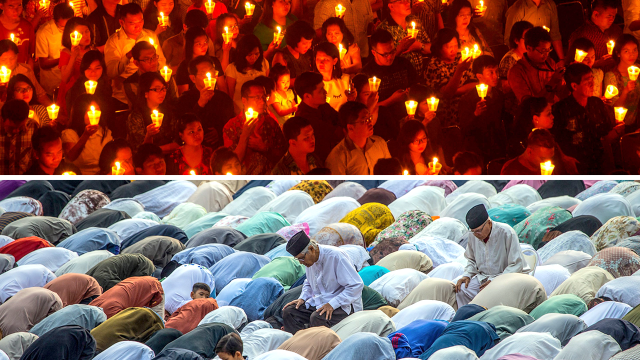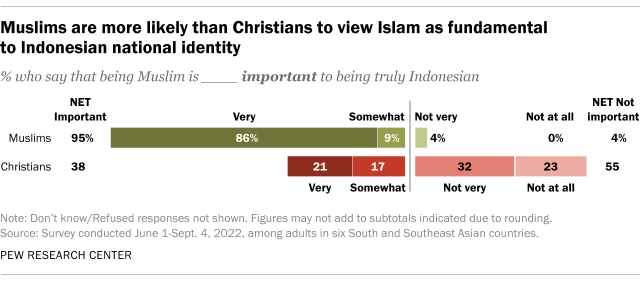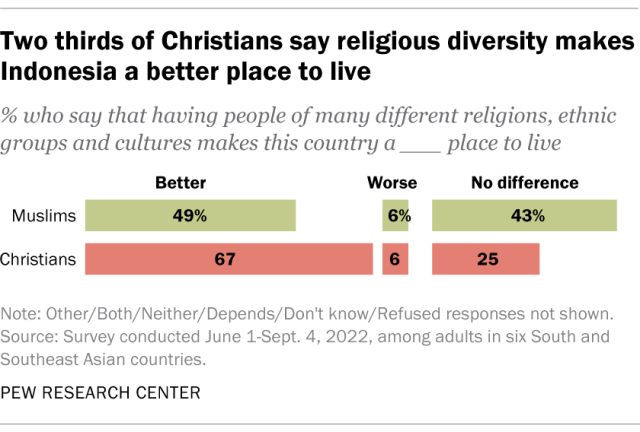
Indonesia is home to more Muslims than any other country, but it also has a large population of Christians. The country’s religious pluralism is again in the spotlight following the recent election of Prabowo Subianto as president. Prabowo has previously received support from religiously conservative Muslim groups.
As the Prabowo era begins, here are five facts about Muslims and Christians in Indonesia, based on Indonesian government statistics, recent Pew Research Center studies and other sources.
This analysis examines religious pluralism in Indonesia. It combines data from Indonesian government records and recent Pew Research Center studies.
Data on the religious makeup of Indonesia comes from a registry maintained by the Ministry of Religious Affairs for the year 2022. Data on the religious makeup of the House of Representatives, or DPR, comes from our analysis of 572 representatives’ profiles available on the DPR’s website, collected in December 2023. Opinion data comes from our nationally representative survey of 2,571 Indonesians conducted as part of a broader study of attitudes in six South and Southeast Asian countries. The survey was fielded from June 1 to Sept. 4, 2022, and results previously were reported in “Buddhism, Islam and Religious Pluralism in South and Southeast Asia.” Data on Indonesian government restrictions comes from our report covering restrictions on religion around the world in 2021.
Indonesia is about 87% Muslim and 11% Christian. Roughly 242 million Muslims and 29 million Christians live in Indonesia, according to data released by the Ministry of Religious Affairs in 2022. The remaining Indonesians mostly identify as Hindu, Buddhist or Confucian.
Indonesia’s Christians are scattered and make up majorities in many of the country’s least populous provinces. For example, the six provinces on the island of Papua in the far east of Indonesia hold 2% of the country’s overall population but 15% of its Christian population. While Christians make up a relatively small share of Indonesia’s population, they account for a larger percentage of elected officials. About 15% of representatives to the House of Representatives, known as the DPR, are Christian, according to official government profiles from 2023.
Muslims and Christians in Indonesia disagree over Islam’s importance to Indonesian identity. An overwhelming majority of Muslims (86%) say it is very important to be Muslim to be truly Indonesian, according to our 2022 survey of South and Southeast Asia. In contrast, 21% of Christians say being Muslim is key to being truly Indonesian. Nearly two-thirds (64%) of Muslims also favor making sharia the official law of the land. (For more on religion and national identity around the world, read “Language and Traditions Are Considered Central to National Identity.”)

Both Muslims and Christians are more likely to view religious diversity as beneficial than as harmful. Very few members of either religious group (6% each) say that having a mix of different religions, ethnicities and cultures makes Indonesia a worse place to live. But Christians are more inclined than Muslims to feel that diversity makes the country better (67% vs. 49%). A substantial minority of Muslims (43%) say religious, ethnic and cultural diversity makes no difference.
Similarly, an overwhelming majority of Christians (84%) say they would be willing to accept Hindus as neighbors, compared with two-thirds of Muslims.

Indonesians of both religions overwhelmingly prefer a democratic form of government. In our 2022 survey, we asked Indonesians to choose between a “democratic form of government” or a “leader with a strong hand” as the better option to solve their country’s problems. Among both Muslims and Christians, 85% prefer a democratic form of government. And majorities of Muslims (76%) and Christians (71%) alike believe that people should be able to publicly criticize the government if they disagree with its actions.
Indonesia officially espouses freedom of religion – but it also tightly regulates it. The country’s constitution guarantees Indonesians the right to choose their own religion and the freedom to worship according to their own beliefs. At the same time, the constitution and the state philosophy of “Pancasila” promote faith “in the One and Only God.” Each Indonesian adult must list a religion on their national identity card. “No religion” is not an available option. Indonesians who leave the field blank or who choose a religion other than the six mentioned in Indonesia’s Blasphemy Law (Muslim, Protestant, Catholic, Buddhist, Hindu or Confucian) may have difficulty accessing government and financial services.
According to news reports, local governments in Indonesia have stopped the construction or ordered the demolition of houses of worship for religious minorities, and a recent Supreme Court ruling called on lower courts to abide by a 1974 law banning interfaith marriages. Also, Indonesia has enforced anti-blasphemy laws against its citizens, including Jakarta’s former governor.
In Pew Research Center’s most recent report tracking global levels of religious restrictions, Indonesia ranks in the “very high” category for government restrictions on religion.
